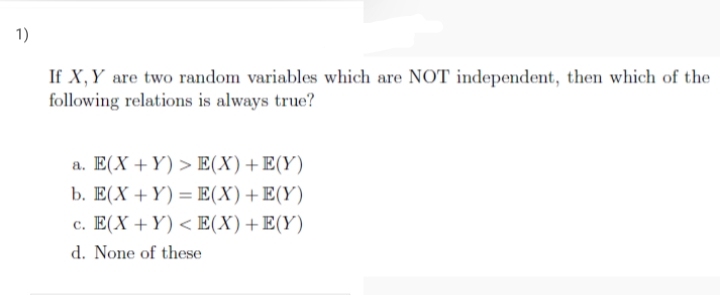If X, Y are two random variables which are NOT independent, then which of the following relations is always true? a. E(X +Y) > E(X)+E(Y) b. E(X +Y) = E(X)+E(Y) c. E(X +Y) < E(X)+E(Y) d. None of these
If X, Y are two random variables which are NOT independent, then which of the following relations is always true? a. E(X +Y) > E(X)+E(Y) b. E(X +Y) = E(X)+E(Y) c. E(X +Y) < E(X)+E(Y) d. None of these
Algebra & Trigonometry with Analytic Geometry
13th Edition
ISBN:9781133382119
Author:Swokowski
Publisher:Swokowski
Chapter10: Sequences, Series, And Probability
Section10.8: Probability
Problem 32E
Related questions
Question

Transcribed Image Text:1)
If X,Y are two random variables which are NOT independent, then which of the
following relations is always true?
a. E(X +Y) > E(X)+E(Y)
b. E(X +Y) = E(X)+E(Y)
c. E(X +Y) < E(X)+E(Y)
d. None of these
Expert Solution
This question has been solved!
Explore an expertly crafted, step-by-step solution for a thorough understanding of key concepts.
Step by step
Solved in 2 steps with 2 images

Recommended textbooks for you

Algebra & Trigonometry with Analytic Geometry
Algebra
ISBN:
9781133382119
Author:
Swokowski
Publisher:
Cengage

Linear Algebra: A Modern Introduction
Algebra
ISBN:
9781285463247
Author:
David Poole
Publisher:
Cengage Learning

Elementary Linear Algebra (MindTap Course List)
Algebra
ISBN:
9781305658004
Author:
Ron Larson
Publisher:
Cengage Learning

Algebra & Trigonometry with Analytic Geometry
Algebra
ISBN:
9781133382119
Author:
Swokowski
Publisher:
Cengage

Linear Algebra: A Modern Introduction
Algebra
ISBN:
9781285463247
Author:
David Poole
Publisher:
Cengage Learning

Elementary Linear Algebra (MindTap Course List)
Algebra
ISBN:
9781305658004
Author:
Ron Larson
Publisher:
Cengage Learning